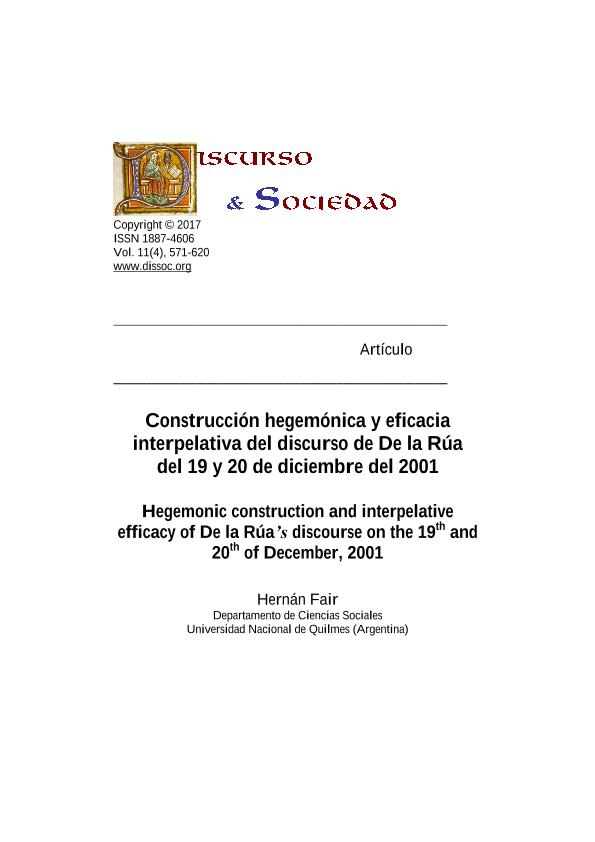Mostrar el registro sencillo del ítem
dc.contributor.author
Fair, Hernán

dc.date.available
2019-04-04T20:08:10Z
dc.date.issued
2017-12
dc.identifier.citation
Fair, Hernán; Construcción hegemónica y eficacia interpelativa del discurso de De la Rúa del 19 y 20 de diciembre del 2001; Universitat Pompeu Fabra. Departamento de Traducción y Ciencias del Lenguaje; Discurso & Sociedad; 11; 4; 12-2017; 571-620
dc.identifier.issn
1887-4606
dc.identifier.uri
http://hdl.handle.net/11336/73217
dc.description.abstract
Este artículo analiza la construcción hegemónica y la eficacia interpelativa del discurso presidencial de Fernando de la Rúa en las jornadas del 19 y 20 de diciembre del 2001. Se concluye que en esta fase final De la Rúa edificó desde su alocución un vínculo de representación política centrado en la defensa neoliberal-conservadora del orden público, como equivalente a la paz social y la gobernabilidad. La frontera de exclusión se delimitaba frente a los hechos de violencia social. Sin embargo, la alteridad constitutiva carecía de agentes concretos e individualizables, por lo que asumía una forma difusa e impersonal. La crisis económica y social también respondía a hechos estructurales producidos externamente, sin causas ni agentes precisos que la encarnaran. Desde el lado enunciativo, el discurso de De la Rúa apeló a una ética de la responsabilidad y la grandeza, a partir de una modalidad deontológica, con el objeto de justificar el Estado de Sitio, la convocatoria a la unidad nacional y el deber de preservar el orden institucional. A través del empleo de una forma verbal antecedida del proceso relacional ?Hay que?, el Presidente subordinaba el componente programático del discurso político y congelaba las demandas opositoras en torno a la modificación del modelo económico y social. Mediante el uso de la voz pasiva y los sustantivos antepuestos a la acción, De la Rúa quitaba responsabilidad política a su figura y a su Gobierno en la crisis, que respondía a circunstancias situadas como ajenas a su voluntad. Al mismo tiempo, reducía la capacidad agentiva para transformar activamente el statu quo del Régimen de Convertibilidad. La apelación a un mandato superyoico de responsabilidad gubernamental y deber institucional y la escenificación de una épica de la grandeza personal, se articulaban con un dispositivo de enunciación desinteresado políticamente. Este dispositivo enunciativo procuraba legitimarse exhibiendo una continuidad biográfica en el accionar presidencial. Desde el análisis de la eficacia hegemónica, a través de las masivas e intensas protestas sociales inmediatamente posteriores a la enunciación presidencial, se evidenció en ambas alocuciones el fracaso interpelativo de De la Rúa en sus pretensiones performativas. La intensa, masiva y persistente resistencia social al autoritarismo oficial contribuyó a la renuncia del Presidente, a la caída de la Alianza y de su modelo de acumulación basado en el ajuste, la precarización laboral y la exclusión social.
dc.description.abstract
This article analyzes the hegemonic construction and the interpelative efficacy of Fernando de la Rúa´s presidential discourse in the days of December 19 and 20, 2001. It is concluded that in this final phase De la Rúa built from his speech a political representation link focused on the neoliberal-conservative defense of public order, as equivalent to social peace and governability. The frontier of exclusion was delimited opposite the facts of social violence. However, the constitutive otherness lacked concrete and individualize agents, so it assumed a diffuse and impersonal form. The economic and social crisis also responded to structural events produced externally, without causes or precise agents that embodied it. From the enunciative side, De la Rúa´s discourse appealed to an ethic of responsibility and greatness, based on a deontological modality, in order to justify the State of Siege, the call to national unity and the duty to preserve the institutional order. Through the use of a verbal form preceded by the relational process “Have to” the President subordinated the programmatic component of the political discourse and froze the opposing demands regarding the modification of the economic and social model. Through the use of the passive voice and the nouns placed before the action, De la Rúa took political responsibility to his figure and his Government in the crisis, which responded to circumstances located as beyond his control. At the same time, it reduced the agentive capacity to actively transform the status quo of the Convertibility Regime. The appeal to a superego mandate of governmental responsibility and institutional duty and the staging of an epic of personal greatness, were articulated with a politically disinterested device of enunciation. This enunciative device sought to legitimize itself by exhibiting a biographical continuity in the presidential action. From the analysis of the hegemonic efficacy, through the massive and intense social protests immediately after the presidential enunciation, was evidenced the interpellative failure of De la Rúa in its performative pretensions. The intense, massive and persistent social resistance to official authoritarianism contributed to the resignation of the President, the fall of the Alliance and its accumulation model based on adjustment, labor precariousness and social exclusion.
dc.format
application/pdf
dc.language.iso
spa
dc.publisher
Universitat Pompeu Fabra. Departamento de Traducción y Ciencias del Lenguaje
dc.rights
info:eu-repo/semantics/openAccess
dc.rights.uri
https://creativecommons.org/licenses/by-nc-sa/2.5/ar/
dc.subject
Crisis del Orden Neoliberal
dc.subject
Construcción Hegemónica
dc.subject
Eficacia Interpelativa
dc.subject
Análisis del Discurso
dc.subject.classification
Estudios Generales del Lenguaje

dc.subject.classification
Lengua y Literatura

dc.subject.classification
HUMANIDADES

dc.title
Construcción hegemónica y eficacia interpelativa del discurso de De la Rúa del 19 y 20 de diciembre del 2001
dc.title
Hegemonic construction and interpelative efficacy of De la Rúa’s discourse on the 19th and 20th of December, 2001
dc.type
info:eu-repo/semantics/article
dc.type
info:ar-repo/semantics/artículo
dc.type
info:eu-repo/semantics/publishedVersion
dc.date.updated
2019-04-04T19:07:30Z
dc.journal.volume
11
dc.journal.number
4
dc.journal.pagination
571-620
dc.journal.pais
España

dc.journal.ciudad
Barcelona
dc.description.fil
Fil: Fair, Hernán. Consejo Nacional de Investigaciones Científicas y Técnicas; Argentina. Universidad Nacional de Quilmes. Departamento de Ciencias Sociales; Argentina
dc.journal.title
Discurso & Sociedad
dc.relation.alternativeid
info:eu-repo/semantics/altIdentifier/url/http://www.dissoc.org/ediciones/v11n04/DS11(4)Fair.html
Archivos asociados
